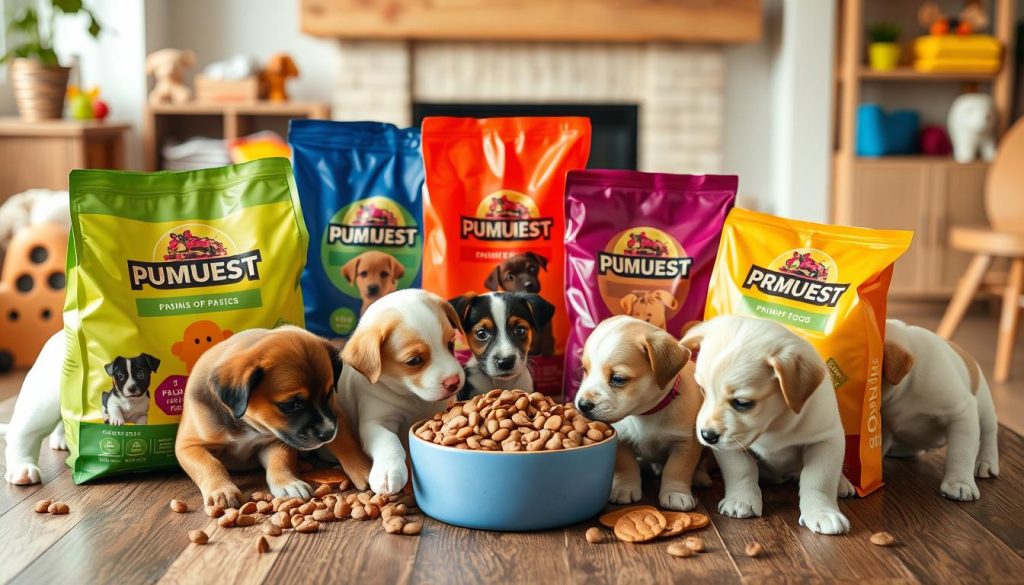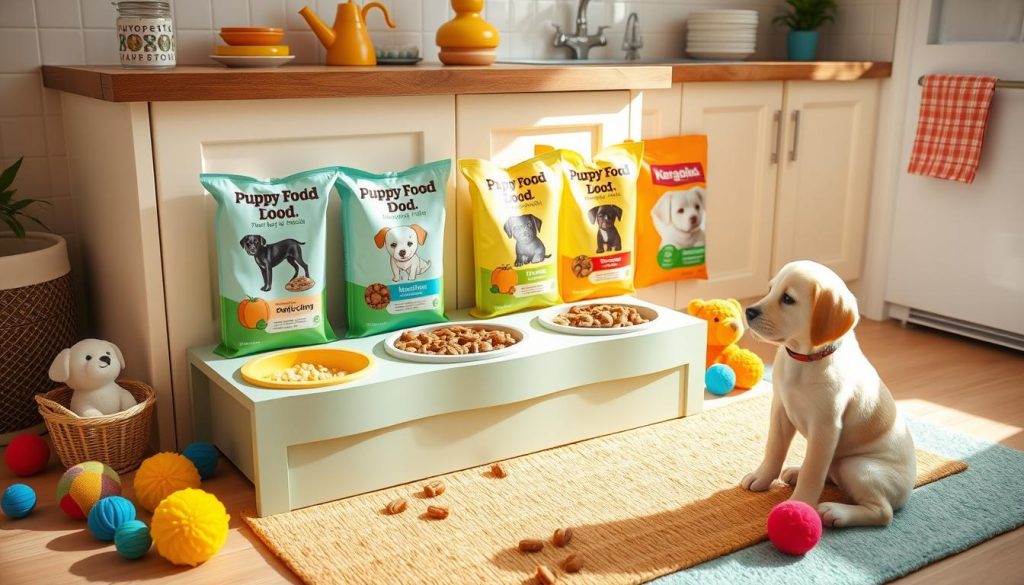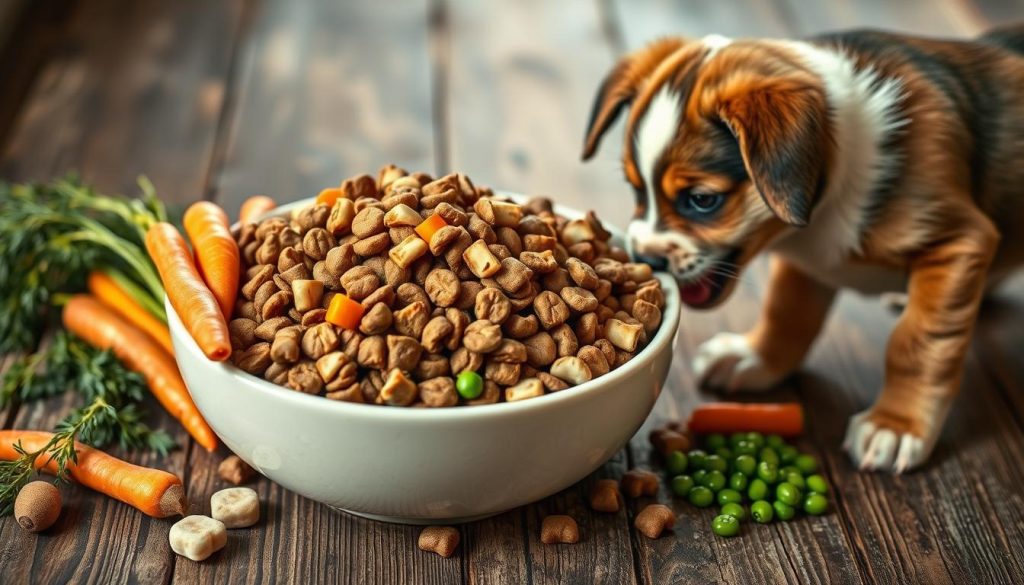Choosing the right puppy food is key for your furry friend’s growth. This guide will help you find the best food for your puppy. We’ll cover everything from dietary needs to top brands, ensuring your pup gets the nourishment they need.
This article covers dry, wet, and homemade puppy food options. We’ll discuss the pros and cons of each, offer tips on feeding, and more. By the end, you’ll know how to pick the best dog food for your puppy’s needs.

Key Takeaways
- Understand the essential nutritional requirements for puppies
- Explore the top puppy food brands and their nutrient profiles
- Learn the differences between dry, wet, and homemade puppy food
- Discover the best feeding practices for portion control and schedules
- Identify the best dog food options for specific puppy breeds and sizes
Decoding Puppy Nutrition: A Comprehensive Guide
We all want the best for our pets. Puppies need special care because their nutritional needs are different from adult dogs. Knowing what they need is key for their growth and health.
Understanding Puppy Dietary Requirements
Puppies need more energy and nutrients than adult dogs. They need a diet full of high-quality proteins, healthy fats, and essential carbohydrates. This helps them grow fast and stay active. The right puppy food balances these nutrients for their health.
The Importance of High-Quality Ingredients
Choosing the right dog food for puppies is important. Look for high-quality, whole-food ingredients. Avoid cheap fillers and choose natural, nutrient-dense sources for puppy food nutrition.
Choose formulas with real meat as the main protein. Also, include wholesome fruits, vegetables, and grains. These support your pup’s immune system and digestion.
“Providing your puppy with a diet rich in high-quality, whole-food ingredients is the foundation for their optimal growth and development.”
By knowing what puppies need and choosing the right puppy food, you can give your pup a great start. Keep reading for more tips on picking the best puppy food for your growing pup.
Puppy Food Reviews: Finding the Best of the Best
Finding the right puppy food can be tough. We’ll look at puppy food reviews to find the top puppy food brands. We’ll check their formulas, ingredients, and what customers say. Our aim is to help you choose the best dog food for your puppy.
Let’s examine some of the top puppy food brands that many love:
- Purina Pro Plan Puppy – It starts with real chicken and has all the nutrients for growth.
- Royal Canin Puppy Food – It’s made for puppies’ special needs, with high-quality ingredients.
- Hill’s Science Diet Puppy – It has top proteins and antioxidants for brain and immune health.
We’ll also look at some hidden gems in puppy food. By checking their nutrients, ingredients, and what people say, we’ll guide you. This way, you can find the best puppy food for your pet.
The best puppy food fits your puppy’s needs. Think about your puppy’s breed, age, and diet needs. With our puppy food reviews, you’ll find the best dog food for a healthy start for your puppy.
Top Puppy Food Brands: A Closer Look
Finding the best dog food for your puppy can be tough. But, by looking at labels, nutrients, and ingredients, we can find the best for your puppy.
Exploring Popular Puppy Food Labels
Understanding puppy food labels is crucial. Look for brands with meat as the first ingredient. Avoid corn, wheat, and soy because they’re hard for puppies to digest. Instead, choose foods with whole grains, veggies, and supplements like probiotics and omega-3s.
Comparing Nutrient Profiles and Ingredients
Comparing different puppy foods can help a lot. Puppies need special nutrients, so check if the food meets AAFCO standards. Make sure the food has enough protein, fat, and vitamins and minerals for your puppy’s growth.
| Brand | Protein | Fat | Fiber | Calcium | Phosphorus |
|---|---|---|---|---|---|
| Brand A | 28% | 18% | 3.5% | 1.2% | 1.0% |
| Brand B | 26% | 16% | 4% | 1.1% | 0.9% |
| Brand C | 24% | 14% | 4.5% | 1.0% | 0.8% |
By carefully checking puppy food brands, you can choose the best for your puppy’s growth and health.
Dry vs. Wet Puppy Food: Pros and Cons
Choosing between dry and wet puppy food can be tough. Both have good points and downsides. Knowing these can help you pick the best food for your puppy.
Dry Puppy Food
Dry puppy food is easy to use and lasts a long time. It’s also cheaper and can be left out for your puppy to eat all day. Plus, it helps keep their teeth clean by encouraging chewing.
Wet Puppy Food
Wet puppy food has lots of water, which is great for puppies who drink less. It tastes better to some puppies and is good for their teeth and stomach.
Transitioning Between Dry and Wet Puppy Food
Switching your puppy’s food should be done slowly to prevent stomach problems. Mix a little of the new food with the old one. Gradually add more new food over a week or two. This helps their stomach get used to the change.
Choosing between dry and wet food depends on your puppy’s needs and health. Talking to your vet can help you decide what’s best for your puppy.
“Choosing the right puppy food is crucial for your pet’s growth and development. Take the time to understand the pros and cons of both dry and wet options to make the best decision for your furry friend.”
Homemade Puppy Food Recipes: A Healthy Alternative
For pet owners who prefer a natural approach, making homemade puppy food is a great choice. It’s both healthy and can save money. We’ll look at the benefits of making your puppy’s meals at home and what ingredients you need for a balanced diet.
Advantages of Homemade Puppy Meals
Making puppy food at home lets you control what your pup eats. You can use fresh, organic puppy food ingredients for the best nutrition. Homemade meals also avoid harmful additives and fillers found in commercial dog food.
Essential Ingredients for Balanced Nutrition
To make a nutritious puppy food recipe, you need the right mix of nutrients. Here are some key ingredients for a healthy homemade puppy food diet:
- Lean proteins (such as chicken, turkey, or lean beef)
- Whole grains (such as brown rice, quinoa, or oats)
- Fresh fruits and vegetables (like sweet potatoes, carrots, and blueberries)
- Healthy fats (such as fish oil or avocado oil)
- Calcium-rich dairy products (like plain yogurt or cottage cheese)
- Vitamin and mineral supplements (if recommended by your veterinarian)
Using these nutrient-rich ingredients, you can make a homemade puppy food that meets your pup’s puppy food nutrition needs. It supports their health and well-being.
“Homemade puppy food allows me to tailor my dog’s diet to their specific needs and preferences, ensuring they get the best possible nutrition.”
Puppy Feeding Guide: Portion Control and Schedules
Feeding your puppy right is key for their growth. We’ll show you how to set up a feeding schedule, find the right food amounts, and switch to adult food. We’ll also share tips on giving your puppy the nutrients they need at each stage.
Establishing a Feeding Schedule
Puppies need different food than adult dogs. They should eat three to four times a day. This helps them get the calories and nutrients they need to grow fast.
Determining Portion Size
The right food amount for your puppy depends on their age, breed, and how active they are. Generally, feed them 2-4 cups of puppy food a day, split into meals. Remember, you might need to change the amount as they grow.
Transitioning to Adult Dog Food
When your puppy is 12-18 months old, it’s time to switch to adult food. Start by mixing in a little adult food each day. This helps their stomach get used to the new food without upset.

Feeding your puppy right is vital for their health. Stick to a schedule, give the right food amounts, and ease them into adult food. This way, your puppy will get the nutrients they need to be happy and healthy.
Best Dog Food for Puppies
Choosing the right dog food for your puppy is very important. It affects their growth, health, and overall well-being. We’ve done a lot of research to find the best puppy food on the market.
We’ve picked three top brands for their quality, balanced nutrition, and great customer feedback. Let’s explore these top choices:
- Purina ONE Puppy Dry Dog Food – This food has real chicken as the first ingredient. It gives your puppy the protein they need. It also has DHA for brain health and antioxidants for a strong immune system.
- Royal Canin Puppy Dry Dog Food – Made by vet nutritionists, this food is tailored for your puppy’s needs. It has easy-to-digest proteins and fibers for healthy digestion.
- Hill’s Science Diet Puppy Dry Dog Food – This food uses natural ingredients and antioxidants. It supports healthy growth, brain development, and a strong immune system. It’s also easy for your puppy to digest.
| Brand | Key Features | Customer Ratings |
|---|---|---|
| Purina ONE Puppy Dry Dog Food | Real chicken as first ingredient, DHA, antioxidants | 4.7/5 stars |
| Royal Canin Puppy Dry Dog Food | Formulated by veterinary nutritionists, highly digestible proteins, fiber | 4.6/5 stars |
| Hill’s Science Diet Puppy Dry Dog Food | Natural ingredients, clinically proven antioxidants, easy digestion | 4.8/5 stars |
These three brands are the best for puppy food. They focus on quality, balanced nutrition, and happy customers. Choosing one of these top brands means you’re giving your puppy the best start in life.
Puppy Food for Specific Breeds and Sizes
Feeding puppies is not a one-size-fits-all job. Different breeds and sizes have unique nutritional needs. We’ll look at what’s best for large and small breed puppies, and the perks of grain-free options.
Large Breed Puppy Food Considerations
Puppies like Great Danes and Newfoundlands need special food. They grow fast and need a diet that helps their bones and joints. Puppy food for large breeds should have the right mix of calories, protein, and nutrients like glucosamine and chondroitin.
Small Breed Puppy Food Options
Small puppies, like Chihuahuas and Yorkies, burn energy quickly. They need food that’s packed with calories but still has the right nutrients. Puppy food for small breeds should have the right balance of protein, fat, and vitamins.
Choosing the right food is key for any puppy, no matter the size. Many brands offer grain-free puppy food for puppies with allergies or sensitivities.

“Selecting the right puppy food is crucial for supporting your pup’s healthy growth and development.”
Grain-Free and Organic Puppy Food Options
Pet owners are looking for more natural and specialized food for their pets. Grain-free and organic puppy food are becoming popular. They offer benefits that meet the needs of growing puppies.
Grain-free puppy food removes common grains like wheat, corn, and rice. These can be hard for some puppies to digest. Instead, it uses sweet potatoes or lentils as energy sources. This is good for puppies with sensitivities or allergies.
Organic puppy food goes even further. It uses certified organic, non-GMO ingredients. It’s free from synthetic additives, pesticides, and harmful substances. It focuses on organic, high-quality proteins, fruits, and vegetables. This makes it a great choice for health-conscious pet owners.
Choosing the best dog food for puppies depends on their needs and your preferences. Always talk to your vet to find the right food for your puppy.
Choosing grain-free or organic puppy food is important. Look for high-quality food that meets your puppy’s nutritional needs. By checking the ingredients and talking to your vet, you can make sure your puppy gets the best nutrition.
Addressing Puppy Food Allergies and Sensitivities
We all want the best for our pets. But, some puppies have food allergies or sensitivities. This can cause health problems. We’ll look at common allergens and how to pick hypoallergenic puppy food.
Identifying Common Food Allergens
The main puppy food allergens are proteins from beef, chicken, dairy, and soy. Puppies with food allergies might have skin issues, stomach problems, or breathing issues. Watch how your puppy reacts to different puppy food ingredients. If you think they have a food allergy, talk to your vet.
Selecting Hypoallergenic Puppy Food
- For a best puppy food for sensitive stomachs, choose formulas with new proteins like lamb or fish. Also, look for sweet potatoes or peas as carbs.
- Go for puppy food without common allergens like beef, chicken, dairy, and soy. These often cause problems.
- Consider grain-free puppy food since some puppies might be sensitive to grains like wheat or corn.
- Check the ingredient list. Pick puppy food with high-quality, easy-to-digest proteins as the main food source.
By picking the right hypoallergenic puppy food, you can help your puppy stay healthy. This ensures they get the nutrients they need to grow strong and happy.
Conclusion
Choosing the right dog food for your puppy is key for their health and growth. Knowing what they need and understanding different food options helps a lot. This way, you can pick the best food for your puppy’s life.
Whether you pick a top puppy food brand or make your own meals, focus on good ingredients. These should give your puppy the nutrients they need to stay strong and healthy. Keeping up with new puppy food nutrition and watching portion sizes is important too. This ensures your puppy gets the best food for their needs.
Keep working with your vet and stay current with puppy feeding guide updates. By focusing on your puppy’s nutrition and giving them the care they need, you’ll have a happy, healthy, and lively friend for many years.
FAQ
What is the best puppy food for my growing furry friend?
The best puppy food varies based on your pup’s needs. Top picks include Purina Pro Plan Puppy, Royal Canin Puppy Food, and Hill’s Science Diet Puppy. Look for high-quality, whole food ingredients that support healthy growth.
How do I ensure my puppy is getting the right nutrition?
Puppies need specific nutrients that adult dogs don’t. Choose a puppy food that matches their needs, with the right mix of proteins, fats, and vitamins. Always check the ingredient list for quality.
What are the benefits of homemade puppy food?
Homemade puppy food is healthy and can save money. It lets you control the ingredients for a balanced diet. Benefits include better digestion, fewer allergies, and tailored nutrition.
How do I transition my puppy to a new food?
Transitioning to a new food should take 7-10 days. Start by mixing a little new food with old, gradually increasing the new food ratio. This prevents upset stomachs and helps your puppy adjust.
What are the best puppy food options for large and small breeds?
Large breed puppies need food lower in calories and higher in calcium for slow growth. Small breed puppies require higher calorie and protein foods for their fast metabolism.
How do I know if my puppy has a food allergy or sensitivity?
Signs include skin issues, excessive scratching, digestive problems, and ear infections. If you suspect a food allergy, consult your vet. They can help find a hypoallergenic food.
Wikipedia article on dog food
Click here to learn blogging to earn money